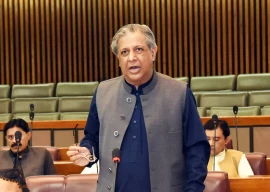
LAHORE:
The Supreme Court of Pakistan had agreed to not to interfere in economic matters, however, the detailed judgment in the matter of Rental Power Projects (RPPs) shows the apex court has charted into that territory once more.
In Watan Party against Federation of Pakistan six years ago, the Supreme Court of Pakistan maintained that “…economic expediencies lack adjudicative disposition and unless the economic decision, based on economic expediencies, is demonstrated to be so violative of constitutional or legal limits on power or so abhorrent to reason, the Courts would decline to interfere.”
I have taken the pain of reading and reviewing the complete text of the Supreme Court’s judgment in the matter of RPPs. The general tone and impression of the Supreme Court verdict is economic and managerial in nature, and to a lesser degree, legal.
More than adjudication on a question of law, this reads like a paper on economic analysis on the performance of RPPs converging on the high costs and price hikes issues. For instance, it argues that “[Data presented] shows that unit cost per kWh of electricity procured from RPPs is exorbitantly on the high side and the electricity generated by RPPs is then to be transmitted to NTDC, which is responsible for its further supply to the consumers after adding charges of overhead transmission and dispatch.”
Although the courts have all the right to debate on the question of facts, such as above, it may be noted, in the light of the Supreme Court own observation, economic policy is too complex to be adjudicated in a court of law. The grey matters of business and economics cannot be explained in the black and white language of law. The same argument of high cost was extended against the IPPs in the nineties and now even the worst detractors of Pakistan Peoples’ Party hail that decision, which brainwashed all memories of load shedding for ten good years.
I have complete faith in the judiciary and respect the judicial notion that there would have been systematic corruption in the matter of the RPP projects. However, the Court’s argument for proving the corruption is debatable, and since its decision is now a public property, it must be thoroughly examined.
In a nutshell, the rationale of Supreme Court’s verdict can be summarised like this: the concessions in contractual terms and conditions, sub-optimal performance of the companies running RPPs and the exorbitant costs of the electricity generated through the RPPs are sufficient reasons to believe that there has been corruption.
Read again: concessions, poor performance and high costs have been construed as evidence of corruption! It seems that the Court has castigated the defendants by assuming their corruption on account of economic uncertainties and contractual complexities.
The judgment does draw on the relevant laws requiring transparency and fair competition and holds that the Public Procurement Rules of 2004 were blatantly violated. By doing this, however, the Supreme Court shows disregard to a decision made by the Economic Coordination Committee of the federal cabinet, which had exempted the RPPs from the Procurement Rules. Current judgment of the Supreme Court on RPPs has serious and lasting repercussions for the regulatory institutions, foreign investment and overall governance. If the government enters into a contract, and the court interferes five years later, and annuls the contract, there is no need to second guess the preference of investors.
They will all go to a state where contract enforcement is practiced. The current decision will do more harm than good with respect to investment scenario.
If private sector firms are able to function, profit and even steal, the blame should really be on the state for failing to arrest corruption. As the libertarian thinker Khalil Ahmad argues in his latest book on the rise of state aristocracy in Pakistan, responsibility of our crisis should be fixed on the watchmen, and not on thieves. A society, which declares its businessmen thieves, and spares the watchmen, can deserve only perpetual darkness.
The writer works as a principal consultant at Development Pool and is a founding member of Economic Freedom Network Pakistan
Published in The Express Tribune, April 23rd, 2012.
COMMENTS (14)
Comments are moderated and generally will be posted if they are on-topic and not abusive.
For more information, please see our Comments FAQ



































































Pricing given by an investor for a project is also linked to the risk perception & credit rating of a country. Take examples of two African countries, pricing for a power project in Congo (marred by civil war) will be much higher than in Botswana (a stable democracy). You cannot ask RPP investors to give you the same pricing as that of China or India (countries with better credit ratings than Pakistan). Just compare the foreign investment figures in Pakistan in the last 10 years, you will understand the link between government incentives & investors' priorities. From economic analysis of law perspective, SC's decision on RPPs will be deemed economically inefficient. We should be rest assured that selective bashing of civilian government by SC will create political grounds for vengeance & more corruption not less...
Reflecting: I have two questions for the author: 1) what constitutes corruption?; 2) Does reading or reviewing SC text qualify us as legal analysts?
It seems to me that this article is looking at the SC judgement entirely from a singular dimension, i.e. economic liberalism. But we forget in our demand for liberalism that it requires corresponding responsibility and the capacity for accountability to self and others, which is missing in the majority, both at the public as well as government level.
Also, it is rather simplistic to say that the "law and its interpretation" is black and white whereas economic policy is complex. In today's world there are shades of gray in all disciplines and complexities beyond belief.
I think in a country where one tries to dispense justice, there are "areas of overlap", shall we measure it against a non Pakistani standard or a Pakistani one?
I want social and economic justice; who if not the SC should play a role in its dispensation? It is important that the right thing is done. Poor performance in delivery of a public good as well as overpricing of a public good is deemed as corruption just as much as misuse and abuse of public monies and time is considered as "corruption".
PCO judges are issuing a new PCO every day. I am more worried about judicial dictatorship than the military dictatorship where you can express freely, to certain degree, what you want without being issued contempt of court.
It is time we should strive to get rid of judicial system where only lawyers are selected as judges. Lets make it more representative and bring an other constitutional court so that SC focus of civil/criminal judicial cases not constitutional cases.
@Abdul Aleem:
crux of articel is, that is what you said. in 90 against PPP govt . That produced so much power that you were about to export that to India. There is no mention in report how much any other RPP would have costed in any other part of world. Comapring price of RPP with hydel, wind or solar is not fair. zero power, is more expensive than any expensive power.
Cancelling contracts , shutting down RPPs is unfair. if they can prove corruption then people should be punished for that, not on whims and fantasies of some white washed people who suspect that corruption has taken place. Politics is business, that is why people are in poltics to do business and then do corruption. This is absolute. Who ever denies that, is delusional, and there are may burgers whose families are rich at the expense of state one way or other. unlimited profit by exploitation is corruption and many people share in MNC working for them. it is just another part of coin.
@Ammar: In Normal Democracy, its a task of Elected assembly to amend Constitution, not Courts!!! But i suppose, this is Pakistan and democracy is only in words, where the policies are decided by various vested interests !!
@Hedgefunder:
They already are writing new constitution :)
I disagree with this article completely. If there is a massive financial corruption by accepting extremely high rates from RPPs, who should we approach to have the culprits booked? Mr. Prime Minister or Mr. President? who are themselves involved, by the way.
BS . Corporate Schill. RPP is an epic scam. Spin it any way you like.
The malpractices are so blatent that it is openly been called 'loot and plunder'. The peoples trust is being abused, what option is left to correct this wrong ?
This really shows, how confused Pakistan's judiciary really is !!!!! Perhaps they will next try to write new constitution too, as its obviously required !!
Absolutely brilliant and bang on target! The present PCO tainted but now Snow White washed Chief Justice has now become what we all detest; Chief Auditor General, Chief Administrator, Chief Police Officer, Chief Persecutor, Chief Law Framer Chief Price Fixer, Chief Posting Officer and Chief Bully. In fact everything but the Chief Justice of the Supreme Court. As a citizen what is more worrying is the fact that it will take decades if not generations to correct the wrongs being done by the Chief Justice in his obsession to degrade the government for personal reasons. An example is the blasphemy laws framed by that big hypocrite Zia. Everyone is against it (save a few obscurantist elements) and yet we cannot do away with it. There is not a field left that the Supreme Court has not poked its nose into. Does not the Chief Justice try to ask himself why his former chief proponents like Mr. Ali Ahmed Kurd, Ms. Asma Jahangir and Mr. Aitizaz Ahsan have deserted him? This and not the value of the plot allotted to the Chairman NAB should give him sleepless nights.
I suspect the SC would argue that when you pay outrageous prices for something it's a clear sign that something is amiss -- toss in a history of corrupt deals made by this and former administrations and the SC has every right to examine this deal. Does that mean the SC is delving into business transactions that it may not have the expertise - maybe - but in the big picture the positives probably outweigh the negatives.
A similar decision was giving in India against 2G licences.. Courts have right to interfere when public money is wasted!! By saying that it will not participate in economic decisions, it means like asking govt to spend its money on bla bla things.. but in contracts where there are clear signs of kick backs and petitioner has valid proof, court has no choice but to interfere!!
So i totally disagree with ur article!